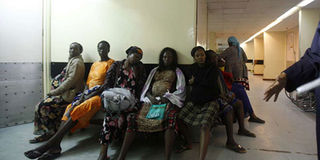Time to end ‘poor medicine for poor people’

Patients wait to consult medics at Kenyatta National Hospital. Health should be considered an indispensable aspect of our national security strategy. PHOTO | FILE | NATION MEDIA GROUP
What you need to know:
- An unhealthy population cannot secure itself. Neither can an unhealthy population benefit from educational or job opportunities that define the modern state.
- In the absence of a national mechanism for managing scarce human resources for health, access to the right to health has been erratic and uncertain for most Kenyans.
There is plenty of noise about the need to revise our Constitution just over eight years since its promulgation.
Since consensus seems to have been reached that we shall have a referendum, it is necessary for those of us in the health sector to have our say in the crafting of potential questions.
Since the beginning of this century, we have made it clear that management of the health sector must follow a rational approach that takes into consideration the importance of the sector in national development.
We have repeatedly made a case for health to be considered an indispensable aspect of our national security strategy.
An unhealthy population cannot secure itself. Neither can an unhealthy population benefit from educational or job opportunities that define the modern state.
RIGHT
It follows, therefore, that we must be more strategic in thinking about the management of our health as a nation.
Importantly, it is my opinion that we got it right in the 2010 Constitution by indicating unequivocally that health is an inalienable right, and the State must take all possible steps to ensure access to the highest attainable standard of healthcare for the people.
This declaration was coupled with provisions for the management of various aspects of health, including the human resources necessary for delivery of this right.
Unfortunately, in our usual shortsighted political manoeuvring, we forgot that the right to health belonged to all Kenyans, and not just those engaged in the health sector, and consequently removed the commission set up to manage human resources for health in favour of institutions with more political mandates.
The right to health was therefore hobbled even before the 2010 referendum.
WEALTH
The resultant chaos in the sector whose responsibility is constitutionally shared between the national and county governments bears out the wisdom of the original drafters of the document.
In the absence of a national mechanism for managing scarce human resources for health, access to the right to health has been erratic and uncertain for most Kenyans.
The first consideration in accessing health services has been individual and county wealth, leaving the vast majority of Kenyans at the mercy of the elements.
Our neglect of the health sector has led to the more imaginative Kenyans coming up with differentiated “packages” of care scaled according to an individual’s socio-economic status.
BIAS
This has resulted in the poor among us being condemned to receiving, erratically, very poor quality of care that is often based not on scientific evidence, but on the whims of the providers and the payers.
I have characterised this, among other similar “initiatives”, as “poor medicine for poor people”, a reality that runs counter to every word in the oath health workers take as they enter their respective professions.
While poor Kenyans become guinea pigs to be used to test patently dangerous theories of health service delivery, the wealthy among us continue to benefit from the best possible interventions guided by the highest level of scientific evidence.
It is time to amend the Constitution to entrench the Health Services Commission and, in addition, to introduce the requirement that public funds shall not be used to procure private services for public servants, especially in critical areas like education, security, and health.
Lukoye Atwoli is Associate Professor of Psychiatry and Dean, Moi University School of Medicine; [email protected]





